2021-2022学年人教版八年级英语下册Unit 2 词汇,短语,语法归纳
文档属性
| 名称 | 2021-2022学年人教版八年级英语下册Unit 2 词汇,短语,语法归纳 | 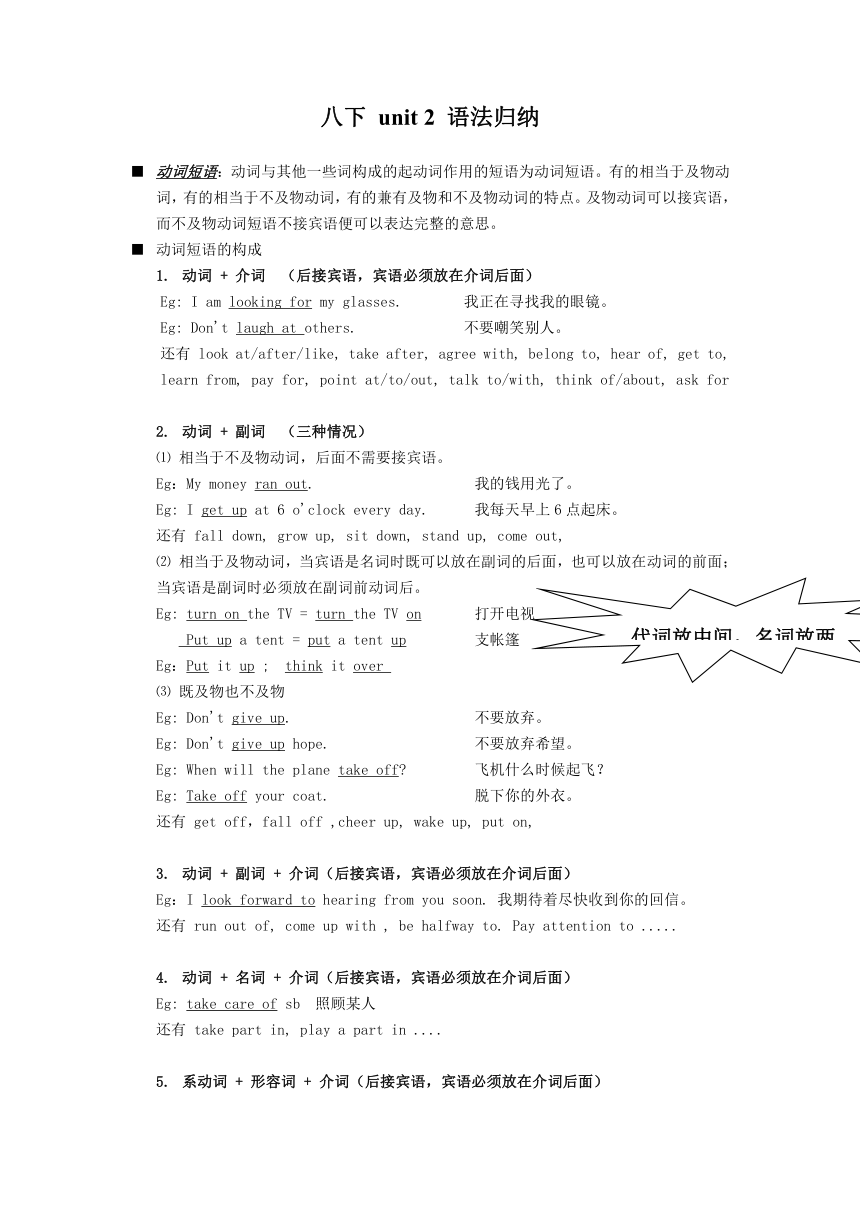 | |
| 格式 | zip | ||
| 文件大小 | 41.9KB | ||
| 资源类型 | 教案 | ||
| 版本资源 | 人教新目标(Go for it)版 | ||
| 科目 | 英语 | ||
| 更新时间 | 2022-03-27 20:11:26 | ||
图片预览

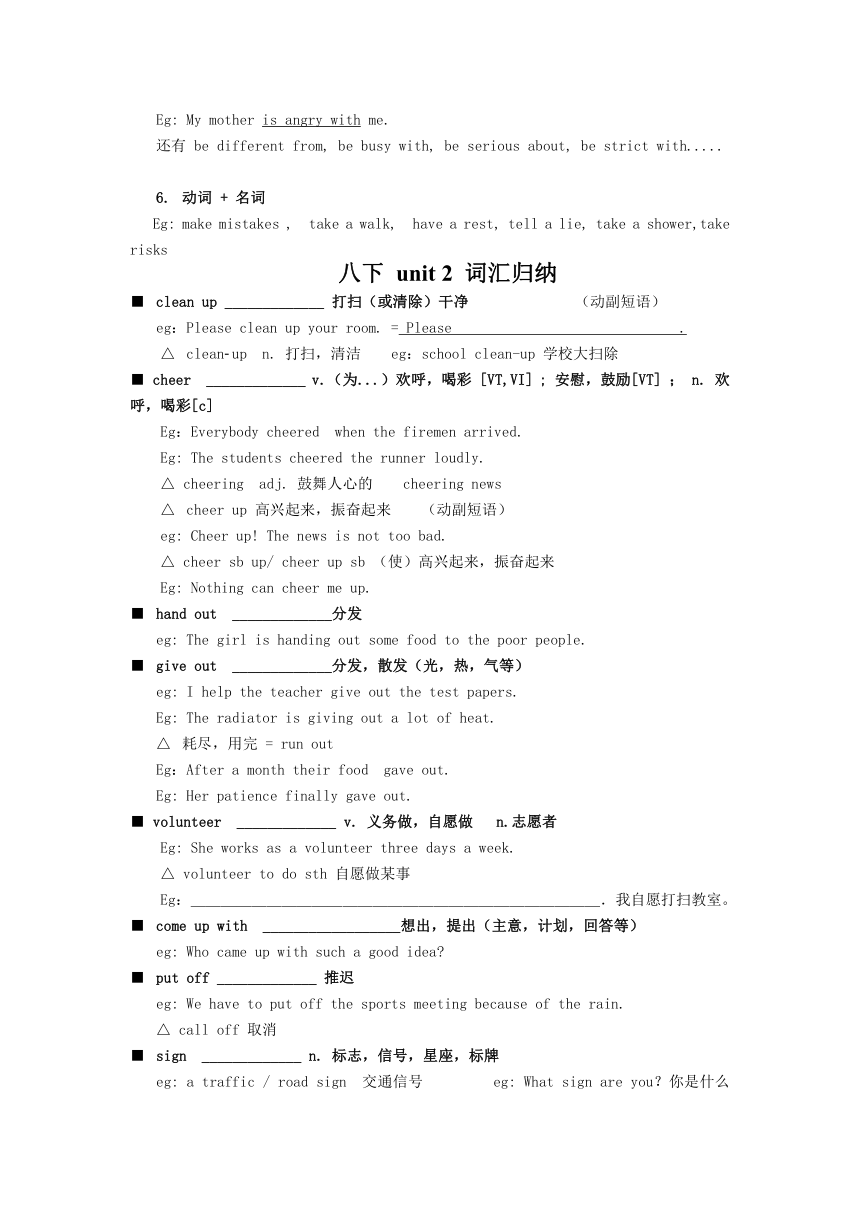
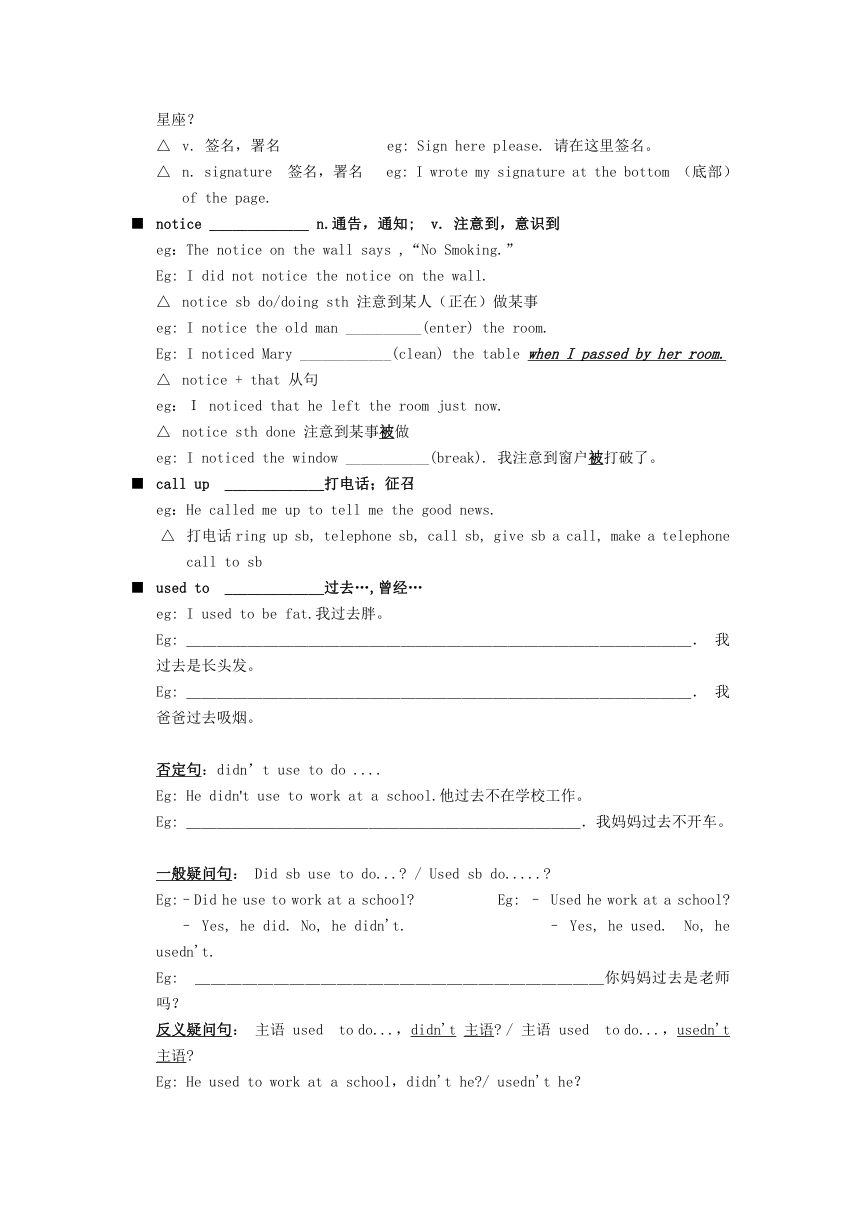
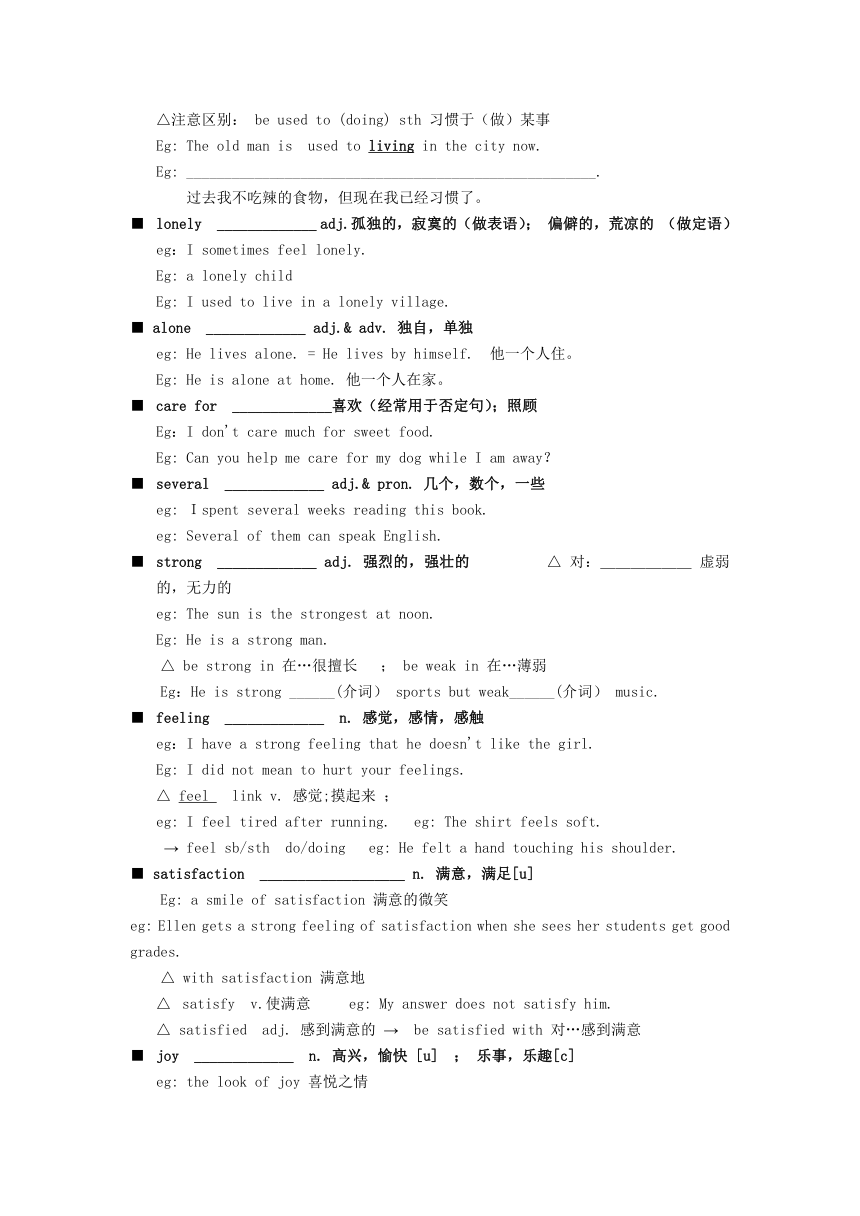
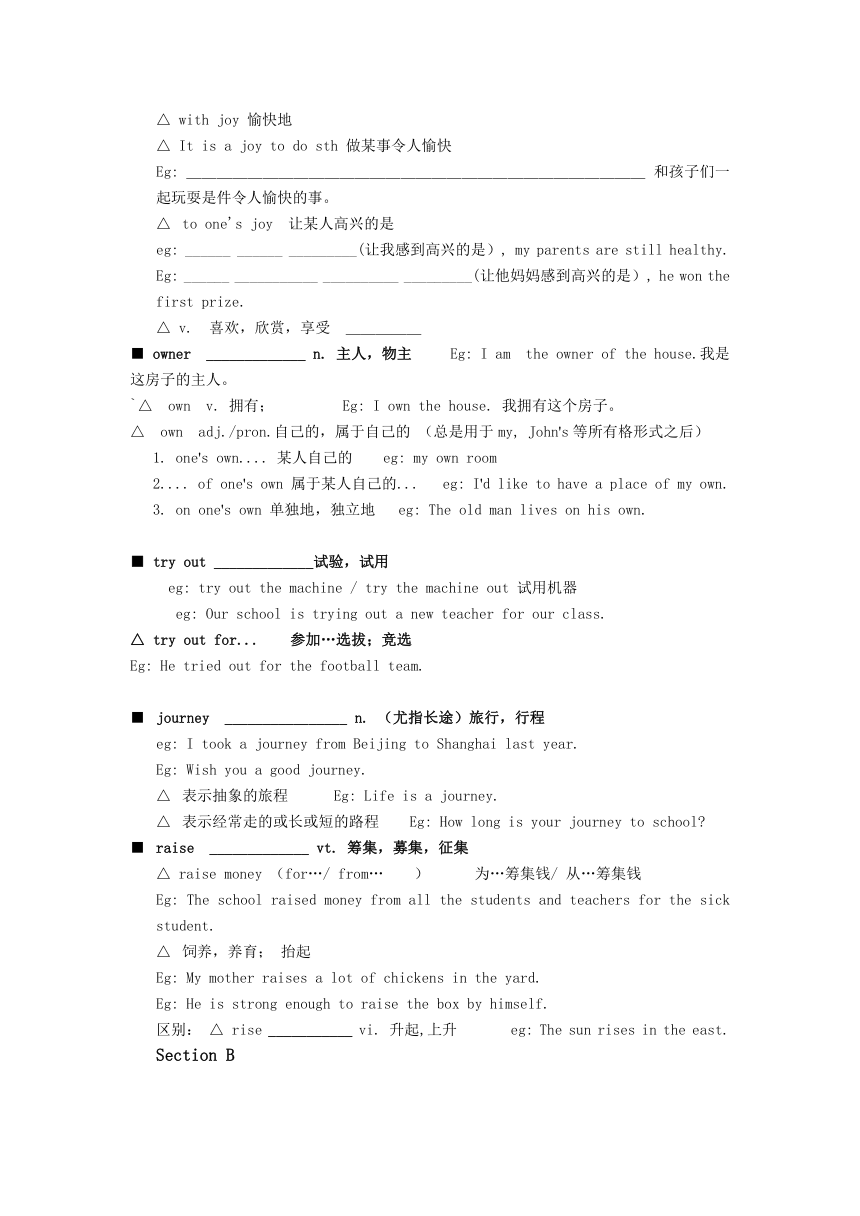
文档简介
八下 unit 2 语法归纳
动词短语:动词与其他一些词构成的起动词作用的短语为动词短语。有的相当于及物动词,有的相当于不及物动词,有的兼有及物和不及物动词的特点。及物动词可以接宾语,而不及物动词短语不接宾语便可以表达完整的意思。
动词短语的构成
动词 + 介词 (后接宾语,宾语必须放在介词后面)
Eg: I am looking for my glasses. 我正在寻找我的眼镜。
Eg: Don't laugh at others. 不要嘲笑别人。
还有 look at/after/like, take after, agree with, belong to, hear of, get to, learn from, pay for, point at/to/out, talk to/with, think of/about, ask for
动词 + 副词 (三种情况)
⑴ 相当于不及物动词,后面不需要接宾语。
Eg:My money ran out. 我的钱用光了。
Eg: I get up at 6 o'clock every day. 我每天早上6点起床。
还有 fall down, grow up, sit down, stand up, come out,
⑵ 相当于及物动词,当宾语是名词时既可以放在副词的后面,也可以放在动词的前面;当宾语是副词时必须放在副词前动词后。
Eg: turn on the TV = turn the TV on 打开电视
Put up a tent = put a tent up 支帐篷
Eg:Put it up ; think it over
⑶ 既及物也不及物
Eg: Don't give up. 不要放弃。
Eg: Don't give up hope. 不要放弃希望。
Eg: When will the plane take off 飞机什么时候起飞?
Eg: Take off your coat. 脱下你的外衣。
还有 get off,fall off ,cheer up, wake up, put on,
动词 + 副词 + 介词(后接宾语,宾语必须放在介词后面)
Eg:I look forward to hearing from you soon. 我期待着尽快收到你的回信。
还有 run out of, come up with , be halfway to. Pay attention to .....
动词 + 名词 + 介词(后接宾语,宾语必须放在介词后面)
Eg: take care of sb 照顾某人
还有 take part in, play a part in ....
系动词 + 形容词 + 介词(后接宾语,宾语必须放在介词后面)
Eg: My mother is angry with me.
还有 be different from, be busy with, be serious about, be strict with.....
动词 + 名词
Eg: make mistakes , take a walk, have a rest, tell a lie, take a shower,take risks
八下 unit 2 词汇归纳
clean up _____________ 打扫(或清除)干净 (动副短语)
eg:Please clean up your room. = Please .
clean up n. 打扫,清洁 eg:school clean-up 学校大扫除
■ cheer _____________ v.(为...)欢呼,喝彩 [VT,VI] ; 安慰,鼓励[VT] ; n. 欢呼,喝彩[c]
Eg:Everybody cheered when the firemen arrived.
Eg: The students cheered the runner loudly.
△ cheering adj. 鼓舞人心的 cheering news
cheer up 高兴起来,振奋起来 (动副短语)
eg: Cheer up! The news is not too bad.
△ cheer sb up/ cheer up sb (使)高兴起来,振奋起来
Eg: Nothing can cheer me up.
hand out _____________分发
eg: The girl is handing out some food to the poor people.
give out _____________分发,散发(光,热,气等)
eg: I help the teacher give out the test papers.
Eg: The radiator is giving out a lot of heat.
耗尽,用完 = run out
Eg:After a month their food gave out.
Eg: Her patience finally gave out.
■ volunteer _____________ v. 义务做,自愿做 n.志愿者
Eg: She works as a volunteer three days a week.
△ volunteer to do sth 自愿做某事
Eg:___________________________.我自愿打扫教室。
come up with __________________想出,提出(主意,计划,回答等)
eg: Who came up with such a good idea
put off _____________ 推迟
eg: We have to put off the sports meeting because of the rain.
△ call off 取消
sign _____________ n. 标志,信号,星座,标牌
eg: a traffic / road sign 交通信号 eg: What sign are you?你是什么星座?
v. 签名,署名 eg: Sign here please. 请在这里签名。
n. signature 签名,署名 eg: I wrote my signature at the bottom (底部)of the page.
notice _____________ n.通告,通知; v. 注意到,意识到
eg:The notice on the wall says ,“No Smoking.”
Eg: I did not notice the notice on the wall.
notice sb do/doing sth 注意到某人(正在)做某事
eg: I notice the old man __________(enter) the room.
Eg: I noticed Mary ____________(clean) the table when I passed by her room.
notice + that 从句
eg:I noticed that he left the room just now.
notice sth done 注意到某事被做
eg: I noticed the window ___________(break). 我注意到窗户被打破了。
call up _____________打电话;征召
eg:He called me up to tell me the good news.
打电话ring up sb, telephone sb, call sb, give sb a call, make a telephone call to sb
used to _____________过去…,曾经…
eg: I used to be fat.我过去胖。
Eg: _________________________________. 我过去是长头发。
Eg: _________________________________. 我爸爸过去吸烟。
否定句:didn’t use to do ....
Eg: He didn't use to work at a school.他过去不在学校工作。
Eg: __________________________.我妈妈过去不开车。
一般疑问句: Did sb use to do... / Used sb do.....
Eg:–Did he use to work at a school Eg: – Used he work at a school
– Yes, he did. No, he didn't. – Yes, he used. No, he usedn't.
Eg: __________________________你妈妈过去是老师吗?
反义疑问句: 主语 used to do...,didn't 主语 / 主语 used to do...,usedn't 主语
Eg: He used to work at a school,didn't he / usedn't he?
△注意区别: be used to (doing) sth 习惯于(做)某事
Eg: The old man is used to living in the city now.
Eg: ______________________________________________________.
过去我不吃辣的食物,但现在我已经习惯了。
lonely _____________ adj.孤独的,寂寞的(做表语); 偏僻的,荒凉的 (做定语)
eg:I sometimes feel lonely.
Eg: a lonely child
Eg: I used to live in a lonely village.
■ alone _____________ adj.& adv. 独自,单独
eg: He lives alone. = He lives by himself. 他一个人住。
Eg: He is alone at home. 他一个人在家。
care for _____________喜欢(经常用于否定句);照顾
Eg:I don't care much for sweet food.
Eg: Can you help me care for my dog while I am away?
several _____________ adj.& pron. 几个,数个,一些
eg: Ispent several weeks reading this book.
eg: Several of them can speak English.
strong _____________ adj. 强烈的,强壮的 △ 对:______ 虚弱的,无力的
eg: The sun is the strongest at noon.
Eg: He is a strong man.
△ be strong in 在…很擅长 ; be weak in 在…薄弱
Eg:He is strong ______(介词) sports but weak______(介词) music.
feeling _____________ n. 感觉,感情,感触
eg:I have a strong feeling that he doesn't like the girl.
Eg: I did not mean to hurt your feelings.
△ feel link v. 感觉;摸起来 ;
eg: I feel tired after running. eg: The shirt feels soft.
→ feel sb/sth do/doing eg: He felt a hand touching his shoulder.
■ satisfaction ___________________ n. 满意,满足[u]
Eg: a smile of satisfaction 满意的微笑
eg: Ellen gets a strong feeling of satisfaction when she sees her students get good grades.
△ with satisfaction 满意地
satisfy v.使满意 eg: My answer does not satisfy him.
△ satisfied adj. 感到满意的 → be satisfied with 对…感到满意
joy _____________ n. 高兴,愉快 [u] ; 乐事,乐趣[c]
eg: the look of joy 喜悦之情
△ with joy 愉快地
△ It is a joy to do sth 做某事令人愉快
Eg: ______________________________ 和孩子们一起玩耍是件令人愉快的事。
to one's joy 让某人高兴的是
eg: ______ ______ _________(让我感到高兴的是), my parents are still healthy.
Eg: ______ ___________ __________ _________(让他妈妈感到高兴的是), he won the first prize.
△ v. 喜欢,欣赏,享受 _____
■ owner _____________ n. 主人,物主 Eg: I am the owner of the house.我是这房子的主人。
`△ own v. 拥有; Eg: I own the house. 我拥有这个房子。
△ own adj./pron.自己的,属于自己的 (总是用于my, John's等所有格形式之后)
1. one's own.... 某人自己的 eg: my own room
2.... of one's own 属于某人自己的... eg: I'd like to have a place of my own.
3. on one's own 单独地,独立地 eg: The old man lives on his own.
■ try out _____________试验,试用
eg: try out the machine / try the machine out 试用机器
eg: Our school is trying out a new teacher for our class.
△ try out for... 参加…选拔;竞选
Eg: He tried out for the football team.
journey ________________ n. (尤指长途)旅行,行程
eg: I took a journey from Beijing to Shanghai last year.
Eg: Wish you a good journey.
表示抽象的旅程 Eg: Life is a journey.
表示经常走的或长或短的路程 Eg: How long is your journey to school
raise _____________ vt. 筹集,募集,征集
△ raise money (for…/ from… ) 为…筹集钱/ 从…筹集钱
Eg: The school raised money from all the students and teachers for the sick student.
饲养,养育; 抬起
Eg: My mother raises a lot of chickens in the yard.
Eg: He is strong enough to raise the box by himself.
区别: △ rise ___________ vi. 升起,上升 eg: The sun rises in the east.
Section B
repair _____________ v. 修理,修补 (常用于修理形状较大,构造复杂,破损比较严重的东西)
eg: repair a road/ house/car
n. 修理 [U]; 具体的修理,维修工作 [C]
eg: The house is under repair. 这房子正在维修中。(固定短语,repair用原形)
eg: The house wants repairs/repairing. 这房子需要修理。(want/need doing 某事需要被做)
fix _____________ v.修理,安装 (多用于口语,常指带有安装,固定性质的修理)
eg: He is good at fixing bicycles. eg:He is fixing a shelf on the wall.
fix up 修理,安装 (强调结果) eg: I fixed the bicycle up for the boy.
mend 修补 (多指修补磨损,穿破,撕毁的简单日常用品) eg: Let me mend the socks for you.
give away __________________赠送,捐赠
eg:I give away the books to the poor children. 我把这些书捐赠给了贫穷的孩子们。
take after _________________(外貌或行为)像
eg: He takes after his father. 他像他爸爸。
broken _____________adj.破损的,残缺的
eg: The cup is broken.
v. break—broke—broken 打破,弄坏
wheel _____________n. 车轮,轮子;方向盘
△ behind/at the wheel = driving a car 在开车
△ wheelchair 轮椅
△ a/the big wheel = an important person (非正式)
letter _____________ n.字母,信函
write letters to 给…写信
eg:________________________________. 请尽快给我写信。
Miss _____________ n.小姐, 女士 (指未婚,用于姓或姓名前)
△ Mrs. 夫人 (用于已婚女士) Ms.女士(用于不确定婚否状况)
■ madam _____________ 女士,夫人,小姐(对女士的尊称,用于已婚和未婚,多用于服务业中对女顾客的称呼。还常用于正式书信的开头。不用于姓氏前,常单独使用)
Eg: Can I help you, Madam (用于服务场所)
Eg: Dear Madam,…… (用于书信)
■ sir _____________ n. 先生; 伯爵 (对男士的尊称,多用于长者,上级或服务业中对男顾客的称呼。可用于已婚和未婚。常单独使用。还用于正式书信的开头。)
△ 对应词: madam
△ 不用于姓氏前,但可以用于名字前。如:詹姆斯.威尔逊伯爵 : Sir James √ Sir Wilson ×
■ set up _____________建立,设立 △ set-set-set
eg: My father set up a school last year. 我爸爸去年建了所学校。
Eg: The school was set up last year.这所年校是去年建的。
disabled _____________ adj. 丧失能力的,有残疾的
△ the disabled 残疾人 eg: Let's try our best to help the disabled.
△ disable v. 丧失能力,残疾 Eg: The accident disabled him for work.事故使他丧失工作能力。
Eg: The illness disabled him from playing football.疾病使他不能再踢球了。
△ able adj. 能够的,有能力的; unable 不能的 → be able/unable to do sth 能够/不能够做某事
■ make a difference ______________________有影响,起作用,使结果不同
Eg: Reading makes a difference to my life.读书对我的生活有很大的影响。
△ make a / no/ some/ much/ a lot of difference
Eg:—Shall we go on Friday or Saturday 我们星期五去还是星期六去?
—It makes no difference to me. 我无所谓。
blind _____________ adj. 瞎的,失明的
eg: He is blind. / He is a blind man. √
eg:His eyes are blind. ×
△blind 指双目失明,一只眼睛瞎了,应说 blind in one eye/blind in the left eye
eg: He is blind in the right eye. 他右眼失明。
the blind 盲人 △ color blind 色盲
引申为 “视而不见,盲目的” eg: Love is sometimes blind. 爱情有时是盲目的。
blind, deaf, dumb 盲,聋,哑
deaf _____________ adj.聋的
the deaf 聋哑人
imagine _____________ v. 想象,设想,认为
imagine + n/ving/ wh- to do/that(wh-)从句 (不能接to do 做宾语)
eg: Can you imagine life without computers Eg: I can not imagine how to do it.
Eg: Can you imagine _____(live) with a drunk Eg: How far do you imagine it is from here
*imagine 后接的宾语从句为特殊疑问句时,疑问句不可放在imagine之后,要放在句首。
imagine + n+ (to be/as ) n/adj.
eg: I imagine him (to be/ as)a big, tall man. v我猜想他是个又高又大的人。
imagine + n+ ving
eg: The little girl sometimes imagines herself_____( become) rich.
这个小女孩有时想象自己变得很富有。
Eg: Imagine yourself _____(sit) on the beach in the sun.设想你自己正坐在 海滩上晒太阳。
△ 否定转移(主语为第一人称)
Eg:I don't imagine he will help us.我认为他不会帮助我们。
Eg: I imagine he can do the job, can't he 我认为他可以做这个工作,他不能吗?
△ n. imagination 想象,想象力
difficulty _____________ n. 困难,难度[u],难事[c]
eg: The disabled have many difficulties in their life.
△ in difficulty 处于困境 △ get into difficulty 陷入困境
△ difficulty in.... 在....有困难
eg: There is no difficulty in finding him. 找到他并不难。
△ have difficulty with sth/ (in) doing sth ……有困难
eg:_____________________________.我在英语方面有困难。
eg:_____________________________.我在学习英语方面有困难。
Eg: People have difficulty ________(breathe)when getting to the top of the mountain.
人们到达山顶时会呼吸困难。
adj. difficult 困难的
△ adv. difficultly = with difficulty 困难地
eg:__________________________________他困难地爬上了山。
open _____________ v. 打开,开 △ 反:close 关
eg: Open/ Close the door. 打开/ 关上门。
△adj. open 开着的 △反 closed 关着的 eg: The door is open/closed. 门是开/关着的。
■ carry _____________ v. 拿,提,运送 (没有方向性)
Eg: Can you help me carry the box
△ bring 带来(带到说话人方向); take 拿,带(去)(带到离说话人远的地方);get/fetch 去取(一个来回)
train _____________ v. 训练,培训 n.火车
train ....for..... eg: I train myself for a race. 我正在为长跑比赛而训练。
training n. 培训,训练
eg: job training 职业培训
excited _____________ adj. 激动的,兴奋的
be excited about sth 对……感到兴奋 Eg: I am excited about the holiday.
be excited about doing sth 对做……感到兴奋
eg: They are excited about ____________(meet) the movie star.
△ be excited to do sth 做某事感到兴奋 Eg: I am excited ______________(see) my old friend.
△ exciting adj. 令人激动的 eg: an exciting movie 一场令人兴奋的电影
△ excite v. 使激动 eg: The toys excited the boy.玩具使男孩很兴奋。
△ excitedly adv. 激动地 △ excitement n. 激动,兴奋
■ kindness _____________ n. 仁慈,善良 Eg: Thank you for your kindness.
kind adj. 亲切的,善良的
clever _____________ adj.聪明的, 聪颖的 eg: He is clever, but his brother is cleverer than him.
understand _____________ v. 理解,领会 △ pt: _____________; pp: _____________
eg: Do you understand (my meaning) 你明白(我的意思)吗?
understanding adj. 善解人意的 eg:My parents are understanding.
change _____________ v.& n. 变化, 改变 [c]; 零钱 [u]
eg: We changed our plan. (vt) 我们改变了计划。
Eg: Our plan changed. (vi)我们的计划改变了。
eg: You need to change trains at Changchun. 你需要在长春换车。
Eg:I have no change with me. 我身上没带零钱。
change... for 把…换.....;以…交换.....
Eg: He changed his bike for a watch.他用自行车换了块表。
Eg: He changed dollars for pounds.他把美金换成了英镑。
change into 变为;换上衣服
eg: Caterpillars change into butterflies.毛毛虫变成了蝴蝶。
Eg: He changed into a new shirt. 他换上了一件新衬衫。
change with 与…交换
Eg: Will you change places with me 你能和我换下位置吗?
interest _____________ n. 兴趣,关注
eg: What are your interests and hobbies
have/show/lose interest in 对…有/表现出/失去 兴趣
eg:______________________________. 他对历史表现出浓厚的兴趣。
v. 使感兴趣,使关注 eg: History does not interest me.
interested adj. 感兴趣的
1. be interested in sb/sth/doing sth 对…感兴趣
2. be interested to do 很有兴趣做某事,很想做某事(指尚未发生的动作)
eg: I am not interested in history. 我对历史不感兴趣。
Eg: I will be interested to hear your opinion. 我有兴趣听听你的见解。
interesting adj. 有趣的 eg: an interesting game 一个有趣的游戏
八下 unit 2 短语归纳
1.clean up 打扫(或清除)干净 2.cheer up (使)振奋起来,变得高兴
3.give out 分发,散发(光,热,气等) 4.hand out 分发
5.give away 捐赠,赠送 6.set up 设立,建立
7.come up with 提出,想出 8.care for 喜欢(常用于否定句);照顾
9.help out 帮助(解决困难,摆脱困境) 10.put up 张贴(图片,布告等);举起
11.put off 推迟 12.take after (外貌或行为)像….
13.try out 参加…选拔;试用 14.call up 打电话,征召
15.fix up 修理,修补 16.work out 解决,成功发展
17.make a difference 有影响,起作用,使结果不同
18.used to 过去曾经,经常
19.volunteer to do sth 自愿做某事
20.be satisfied with 对…感到满意
21.notice sb do (doing) sth 注意到某人(正在)做某事
22.raise money 筹集钱
23.in hospital 住院
24.in the hospital 在医院里
25.a group of 一群,一组
26.make a plan/plans 制定计划
27.one day 一天
28.at the age of 在…岁时
29.at the same time 同时
30.come true 希望,理想等)实现
31.at least 至少
32.have difficulty (in) doing sth 做某事有困难
33.have difficulty with sth 在某方面有困难
34.be similar to 与…相似
35.thank sb for sth/doing sth 因(做)某事而感谢某人
36.send sb sth= send sth to sb 寄给某人某物
37.at once 立刻,马上
38.be excited about 对…感到兴奋
39.be strong in 在….方面擅长
40.be interested in 对…感兴趣
41.have/show/lose interest in 对…有/表现出/失去 兴趣
42.Make it possible for sb to do sth 使某人做某事成为可能
动词短语:动词与其他一些词构成的起动词作用的短语为动词短语。有的相当于及物动词,有的相当于不及物动词,有的兼有及物和不及物动词的特点。及物动词可以接宾语,而不及物动词短语不接宾语便可以表达完整的意思。
动词短语的构成
动词 + 介词 (后接宾语,宾语必须放在介词后面)
Eg: I am looking for my glasses. 我正在寻找我的眼镜。
Eg: Don't laugh at others. 不要嘲笑别人。
还有 look at/after/like, take after, agree with, belong to, hear of, get to, learn from, pay for, point at/to/out, talk to/with, think of/about, ask for
动词 + 副词 (三种情况)
⑴ 相当于不及物动词,后面不需要接宾语。
Eg:My money ran out. 我的钱用光了。
Eg: I get up at 6 o'clock every day. 我每天早上6点起床。
还有 fall down, grow up, sit down, stand up, come out,
⑵ 相当于及物动词,当宾语是名词时既可以放在副词的后面,也可以放在动词的前面;当宾语是副词时必须放在副词前动词后。
Eg: turn on the TV = turn the TV on 打开电视
Put up a tent = put a tent up 支帐篷
Eg:Put it up ; think it over
⑶ 既及物也不及物
Eg: Don't give up. 不要放弃。
Eg: Don't give up hope. 不要放弃希望。
Eg: When will the plane take off 飞机什么时候起飞?
Eg: Take off your coat. 脱下你的外衣。
还有 get off,fall off ,cheer up, wake up, put on,
动词 + 副词 + 介词(后接宾语,宾语必须放在介词后面)
Eg:I look forward to hearing from you soon. 我期待着尽快收到你的回信。
还有 run out of, come up with , be halfway to. Pay attention to .....
动词 + 名词 + 介词(后接宾语,宾语必须放在介词后面)
Eg: take care of sb 照顾某人
还有 take part in, play a part in ....
系动词 + 形容词 + 介词(后接宾语,宾语必须放在介词后面)
Eg: My mother is angry with me.
还有 be different from, be busy with, be serious about, be strict with.....
动词 + 名词
Eg: make mistakes , take a walk, have a rest, tell a lie, take a shower,take risks
八下 unit 2 词汇归纳
clean up _____________ 打扫(或清除)干净 (动副短语)
eg:Please clean up your room. = Please .
clean up n. 打扫,清洁 eg:school clean-up 学校大扫除
■ cheer _____________ v.(为...)欢呼,喝彩 [VT,VI] ; 安慰,鼓励[VT] ; n. 欢呼,喝彩[c]
Eg:Everybody cheered when the firemen arrived.
Eg: The students cheered the runner loudly.
△ cheering adj. 鼓舞人心的 cheering news
cheer up 高兴起来,振奋起来 (动副短语)
eg: Cheer up! The news is not too bad.
△ cheer sb up/ cheer up sb (使)高兴起来,振奋起来
Eg: Nothing can cheer me up.
hand out _____________分发
eg: The girl is handing out some food to the poor people.
give out _____________分发,散发(光,热,气等)
eg: I help the teacher give out the test papers.
Eg: The radiator is giving out a lot of heat.
耗尽,用完 = run out
Eg:After a month their food gave out.
Eg: Her patience finally gave out.
■ volunteer _____________ v. 义务做,自愿做 n.志愿者
Eg: She works as a volunteer three days a week.
△ volunteer to do sth 自愿做某事
Eg:___________________________.我自愿打扫教室。
come up with __________________想出,提出(主意,计划,回答等)
eg: Who came up with such a good idea
put off _____________ 推迟
eg: We have to put off the sports meeting because of the rain.
△ call off 取消
sign _____________ n. 标志,信号,星座,标牌
eg: a traffic / road sign 交通信号 eg: What sign are you?你是什么星座?
v. 签名,署名 eg: Sign here please. 请在这里签名。
n. signature 签名,署名 eg: I wrote my signature at the bottom (底部)of the page.
notice _____________ n.通告,通知; v. 注意到,意识到
eg:The notice on the wall says ,“No Smoking.”
Eg: I did not notice the notice on the wall.
notice sb do/doing sth 注意到某人(正在)做某事
eg: I notice the old man __________(enter) the room.
Eg: I noticed Mary ____________(clean) the table when I passed by her room.
notice + that 从句
eg:I noticed that he left the room just now.
notice sth done 注意到某事被做
eg: I noticed the window ___________(break). 我注意到窗户被打破了。
call up _____________打电话;征召
eg:He called me up to tell me the good news.
打电话ring up sb, telephone sb, call sb, give sb a call, make a telephone call to sb
used to _____________过去…,曾经…
eg: I used to be fat.我过去胖。
Eg: _________________________________. 我过去是长头发。
Eg: _________________________________. 我爸爸过去吸烟。
否定句:didn’t use to do ....
Eg: He didn't use to work at a school.他过去不在学校工作。
Eg: __________________________.我妈妈过去不开车。
一般疑问句: Did sb use to do... / Used sb do.....
Eg:–Did he use to work at a school Eg: – Used he work at a school
– Yes, he did. No, he didn't. – Yes, he used. No, he usedn't.
Eg: __________________________你妈妈过去是老师吗?
反义疑问句: 主语 used to do...,didn't 主语 / 主语 used to do...,usedn't 主语
Eg: He used to work at a school,didn't he / usedn't he?
△注意区别: be used to (doing) sth 习惯于(做)某事
Eg: The old man is used to living in the city now.
Eg: ______________________________________________________.
过去我不吃辣的食物,但现在我已经习惯了。
lonely _____________ adj.孤独的,寂寞的(做表语); 偏僻的,荒凉的 (做定语)
eg:I sometimes feel lonely.
Eg: a lonely child
Eg: I used to live in a lonely village.
■ alone _____________ adj.& adv. 独自,单独
eg: He lives alone. = He lives by himself. 他一个人住。
Eg: He is alone at home. 他一个人在家。
care for _____________喜欢(经常用于否定句);照顾
Eg:I don't care much for sweet food.
Eg: Can you help me care for my dog while I am away?
several _____________ adj.& pron. 几个,数个,一些
eg: Ispent several weeks reading this book.
eg: Several of them can speak English.
strong _____________ adj. 强烈的,强壮的 △ 对:______ 虚弱的,无力的
eg: The sun is the strongest at noon.
Eg: He is a strong man.
△ be strong in 在…很擅长 ; be weak in 在…薄弱
Eg:He is strong ______(介词) sports but weak______(介词) music.
feeling _____________ n. 感觉,感情,感触
eg:I have a strong feeling that he doesn't like the girl.
Eg: I did not mean to hurt your feelings.
△ feel link v. 感觉;摸起来 ;
eg: I feel tired after running. eg: The shirt feels soft.
→ feel sb/sth do/doing eg: He felt a hand touching his shoulder.
■ satisfaction ___________________ n. 满意,满足[u]
Eg: a smile of satisfaction 满意的微笑
eg: Ellen gets a strong feeling of satisfaction when she sees her students get good grades.
△ with satisfaction 满意地
satisfy v.使满意 eg: My answer does not satisfy him.
△ satisfied adj. 感到满意的 → be satisfied with 对…感到满意
joy _____________ n. 高兴,愉快 [u] ; 乐事,乐趣[c]
eg: the look of joy 喜悦之情
△ with joy 愉快地
△ It is a joy to do sth 做某事令人愉快
Eg: ______________________________ 和孩子们一起玩耍是件令人愉快的事。
to one's joy 让某人高兴的是
eg: ______ ______ _________(让我感到高兴的是), my parents are still healthy.
Eg: ______ ___________ __________ _________(让他妈妈感到高兴的是), he won the first prize.
△ v. 喜欢,欣赏,享受 _____
■ owner _____________ n. 主人,物主 Eg: I am the owner of the house.我是这房子的主人。
`△ own v. 拥有; Eg: I own the house. 我拥有这个房子。
△ own adj./pron.自己的,属于自己的 (总是用于my, John's等所有格形式之后)
1. one's own.... 某人自己的 eg: my own room
2.... of one's own 属于某人自己的... eg: I'd like to have a place of my own.
3. on one's own 单独地,独立地 eg: The old man lives on his own.
■ try out _____________试验,试用
eg: try out the machine / try the machine out 试用机器
eg: Our school is trying out a new teacher for our class.
△ try out for... 参加…选拔;竞选
Eg: He tried out for the football team.
journey ________________ n. (尤指长途)旅行,行程
eg: I took a journey from Beijing to Shanghai last year.
Eg: Wish you a good journey.
表示抽象的旅程 Eg: Life is a journey.
表示经常走的或长或短的路程 Eg: How long is your journey to school
raise _____________ vt. 筹集,募集,征集
△ raise money (for…/ from… ) 为…筹集钱/ 从…筹集钱
Eg: The school raised money from all the students and teachers for the sick student.
饲养,养育; 抬起
Eg: My mother raises a lot of chickens in the yard.
Eg: He is strong enough to raise the box by himself.
区别: △ rise ___________ vi. 升起,上升 eg: The sun rises in the east.
Section B
repair _____________ v. 修理,修补 (常用于修理形状较大,构造复杂,破损比较严重的东西)
eg: repair a road/ house/car
n. 修理 [U]; 具体的修理,维修工作 [C]
eg: The house is under repair. 这房子正在维修中。(固定短语,repair用原形)
eg: The house wants repairs/repairing. 这房子需要修理。(want/need doing 某事需要被做)
fix _____________ v.修理,安装 (多用于口语,常指带有安装,固定性质的修理)
eg: He is good at fixing bicycles. eg:He is fixing a shelf on the wall.
fix up 修理,安装 (强调结果) eg: I fixed the bicycle up for the boy.
mend 修补 (多指修补磨损,穿破,撕毁的简单日常用品) eg: Let me mend the socks for you.
give away __________________赠送,捐赠
eg:I give away the books to the poor children. 我把这些书捐赠给了贫穷的孩子们。
take after _________________(外貌或行为)像
eg: He takes after his father. 他像他爸爸。
broken _____________adj.破损的,残缺的
eg: The cup is broken.
v. break—broke—broken 打破,弄坏
wheel _____________n. 车轮,轮子;方向盘
△ behind/at the wheel = driving a car 在开车
△ wheelchair 轮椅
△ a/the big wheel = an important person (非正式)
letter _____________ n.字母,信函
write letters to 给…写信
eg:________________________________. 请尽快给我写信。
Miss _____________ n.小姐, 女士 (指未婚,用于姓或姓名前)
△ Mrs. 夫人 (用于已婚女士) Ms.女士(用于不确定婚否状况)
■ madam _____________ 女士,夫人,小姐(对女士的尊称,用于已婚和未婚,多用于服务业中对女顾客的称呼。还常用于正式书信的开头。不用于姓氏前,常单独使用)
Eg: Can I help you, Madam (用于服务场所)
Eg: Dear Madam,…… (用于书信)
■ sir _____________ n. 先生; 伯爵 (对男士的尊称,多用于长者,上级或服务业中对男顾客的称呼。可用于已婚和未婚。常单独使用。还用于正式书信的开头。)
△ 对应词: madam
△ 不用于姓氏前,但可以用于名字前。如:詹姆斯.威尔逊伯爵 : Sir James √ Sir Wilson ×
■ set up _____________建立,设立 △ set-set-set
eg: My father set up a school last year. 我爸爸去年建了所学校。
Eg: The school was set up last year.这所年校是去年建的。
disabled _____________ adj. 丧失能力的,有残疾的
△ the disabled 残疾人 eg: Let's try our best to help the disabled.
△ disable v. 丧失能力,残疾 Eg: The accident disabled him for work.事故使他丧失工作能力。
Eg: The illness disabled him from playing football.疾病使他不能再踢球了。
△ able adj. 能够的,有能力的; unable 不能的 → be able/unable to do sth 能够/不能够做某事
■ make a difference ______________________有影响,起作用,使结果不同
Eg: Reading makes a difference to my life.读书对我的生活有很大的影响。
△ make a / no/ some/ much/ a lot of difference
Eg:—Shall we go on Friday or Saturday 我们星期五去还是星期六去?
—It makes no difference to me. 我无所谓。
blind _____________ adj. 瞎的,失明的
eg: He is blind. / He is a blind man. √
eg:His eyes are blind. ×
△blind 指双目失明,一只眼睛瞎了,应说 blind in one eye/blind in the left eye
eg: He is blind in the right eye. 他右眼失明。
the blind 盲人 △ color blind 色盲
引申为 “视而不见,盲目的” eg: Love is sometimes blind. 爱情有时是盲目的。
blind, deaf, dumb 盲,聋,哑
deaf _____________ adj.聋的
the deaf 聋哑人
imagine _____________ v. 想象,设想,认为
imagine + n/ving/ wh- to do/that(wh-)从句 (不能接to do 做宾语)
eg: Can you imagine life without computers Eg: I can not imagine how to do it.
Eg: Can you imagine _____(live) with a drunk Eg: How far do you imagine it is from here
*imagine 后接的宾语从句为特殊疑问句时,疑问句不可放在imagine之后,要放在句首。
imagine + n+ (to be/as ) n/adj.
eg: I imagine him (to be/ as)a big, tall man. v我猜想他是个又高又大的人。
imagine + n+ ving
eg: The little girl sometimes imagines herself_____( become) rich.
这个小女孩有时想象自己变得很富有。
Eg: Imagine yourself _____(sit) on the beach in the sun.设想你自己正坐在 海滩上晒太阳。
△ 否定转移(主语为第一人称)
Eg:I don't imagine he will help us.我认为他不会帮助我们。
Eg: I imagine he can do the job, can't he 我认为他可以做这个工作,他不能吗?
△ n. imagination 想象,想象力
difficulty _____________ n. 困难,难度[u],难事[c]
eg: The disabled have many difficulties in their life.
△ in difficulty 处于困境 △ get into difficulty 陷入困境
△ difficulty in.... 在....有困难
eg: There is no difficulty in finding him. 找到他并不难。
△ have difficulty with sth/ (in) doing sth ……有困难
eg:_____________________________.我在英语方面有困难。
eg:_____________________________.我在学习英语方面有困难。
Eg: People have difficulty ________(breathe)when getting to the top of the mountain.
人们到达山顶时会呼吸困难。
adj. difficult 困难的
△ adv. difficultly = with difficulty 困难地
eg:__________________________________他困难地爬上了山。
open _____________ v. 打开,开 △ 反:close 关
eg: Open/ Close the door. 打开/ 关上门。
△adj. open 开着的 △反 closed 关着的 eg: The door is open/closed. 门是开/关着的。
■ carry _____________ v. 拿,提,运送 (没有方向性)
Eg: Can you help me carry the box
△ bring 带来(带到说话人方向); take 拿,带(去)(带到离说话人远的地方);get/fetch 去取(一个来回)
train _____________ v. 训练,培训 n.火车
train ....for..... eg: I train myself for a race. 我正在为长跑比赛而训练。
training n. 培训,训练
eg: job training 职业培训
excited _____________ adj. 激动的,兴奋的
be excited about sth 对……感到兴奋 Eg: I am excited about the holiday.
be excited about doing sth 对做……感到兴奋
eg: They are excited about ____________(meet) the movie star.
△ be excited to do sth 做某事感到兴奋 Eg: I am excited ______________(see) my old friend.
△ exciting adj. 令人激动的 eg: an exciting movie 一场令人兴奋的电影
△ excite v. 使激动 eg: The toys excited the boy.玩具使男孩很兴奋。
△ excitedly adv. 激动地 △ excitement n. 激动,兴奋
■ kindness _____________ n. 仁慈,善良 Eg: Thank you for your kindness.
kind adj. 亲切的,善良的
clever _____________ adj.聪明的, 聪颖的 eg: He is clever, but his brother is cleverer than him.
understand _____________ v. 理解,领会 △ pt: _____________; pp: _____________
eg: Do you understand (my meaning) 你明白(我的意思)吗?
understanding adj. 善解人意的 eg:My parents are understanding.
change _____________ v.& n. 变化, 改变 [c]; 零钱 [u]
eg: We changed our plan. (vt) 我们改变了计划。
Eg: Our plan changed. (vi)我们的计划改变了。
eg: You need to change trains at Changchun. 你需要在长春换车。
Eg:I have no change with me. 我身上没带零钱。
change... for 把…换.....;以…交换.....
Eg: He changed his bike for a watch.他用自行车换了块表。
Eg: He changed dollars for pounds.他把美金换成了英镑。
change into 变为;换上衣服
eg: Caterpillars change into butterflies.毛毛虫变成了蝴蝶。
Eg: He changed into a new shirt. 他换上了一件新衬衫。
change with 与…交换
Eg: Will you change places with me 你能和我换下位置吗?
interest _____________ n. 兴趣,关注
eg: What are your interests and hobbies
have/show/lose interest in 对…有/表现出/失去 兴趣
eg:______________________________. 他对历史表现出浓厚的兴趣。
v. 使感兴趣,使关注 eg: History does not interest me.
interested adj. 感兴趣的
1. be interested in sb/sth/doing sth 对…感兴趣
2. be interested to do 很有兴趣做某事,很想做某事(指尚未发生的动作)
eg: I am not interested in history. 我对历史不感兴趣。
Eg: I will be interested to hear your opinion. 我有兴趣听听你的见解。
interesting adj. 有趣的 eg: an interesting game 一个有趣的游戏
八下 unit 2 短语归纳
1.clean up 打扫(或清除)干净 2.cheer up (使)振奋起来,变得高兴
3.give out 分发,散发(光,热,气等) 4.hand out 分发
5.give away 捐赠,赠送 6.set up 设立,建立
7.come up with 提出,想出 8.care for 喜欢(常用于否定句);照顾
9.help out 帮助(解决困难,摆脱困境) 10.put up 张贴(图片,布告等);举起
11.put off 推迟 12.take after (外貌或行为)像….
13.try out 参加…选拔;试用 14.call up 打电话,征召
15.fix up 修理,修补 16.work out 解决,成功发展
17.make a difference 有影响,起作用,使结果不同
18.used to 过去曾经,经常
19.volunteer to do sth 自愿做某事
20.be satisfied with 对…感到满意
21.notice sb do (doing) sth 注意到某人(正在)做某事
22.raise money 筹集钱
23.in hospital 住院
24.in the hospital 在医院里
25.a group of 一群,一组
26.make a plan/plans 制定计划
27.one day 一天
28.at the age of 在…岁时
29.at the same time 同时
30.come true 希望,理想等)实现
31.at least 至少
32.have difficulty (in) doing sth 做某事有困难
33.have difficulty with sth 在某方面有困难
34.be similar to 与…相似
35.thank sb for sth/doing sth 因(做)某事而感谢某人
36.send sb sth= send sth to sb 寄给某人某物
37.at once 立刻,马上
38.be excited about 对…感到兴奋
39.be strong in 在….方面擅长
40.be interested in 对…感兴趣
41.have/show/lose interest in 对…有/表现出/失去 兴趣
42.Make it possible for sb to do sth 使某人做某事成为可能
同课章节目录
- Unit 1 What's the matter?
- Section A
- Section B
- Unit 2 I'll help to clean up the city parks.
- Section A
- Section B
- Unit 3 Could you please clean your room?
- Section A
- Section B
- Unit 4 Why don't you talk to your parents?
- Section A
- Section B
- Unit 5 What were you doing when the rainstorm came
- Section A
- Section B
- Review of Units 1-5
- Unit 6 An old man tried to move the mountains.
- Section A
- Section B
- Unit 7 What's the highest mountain in the world?
- Section A
- Section B
- Unit 8 Have you read Treasure Island yet?
- Section A
- Section B
- Unit 9 Have you ever been to a museum?
- Section A
- Section B
- Unit 10 I've had this bike for three years.
- Section A
- Section B
